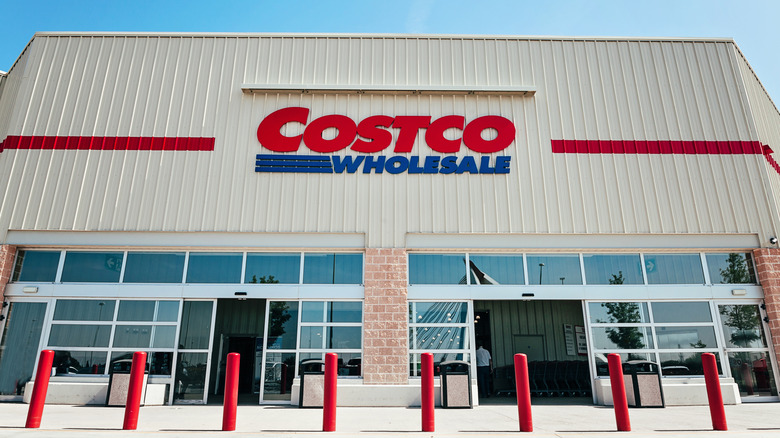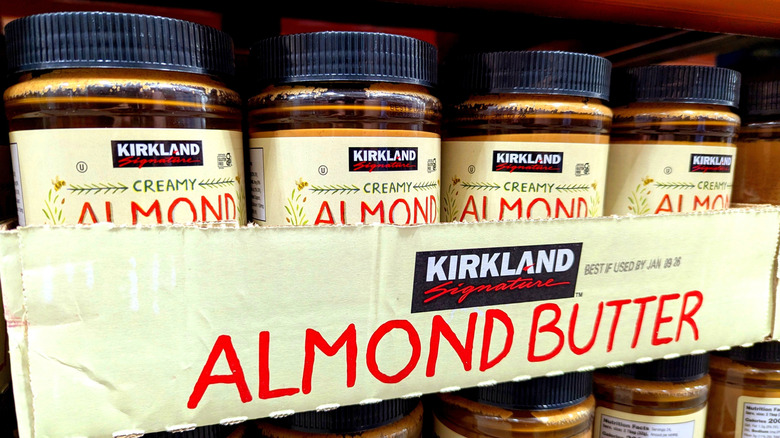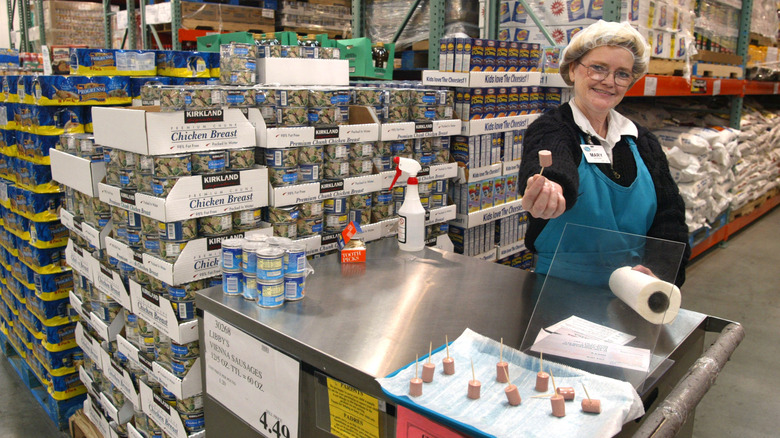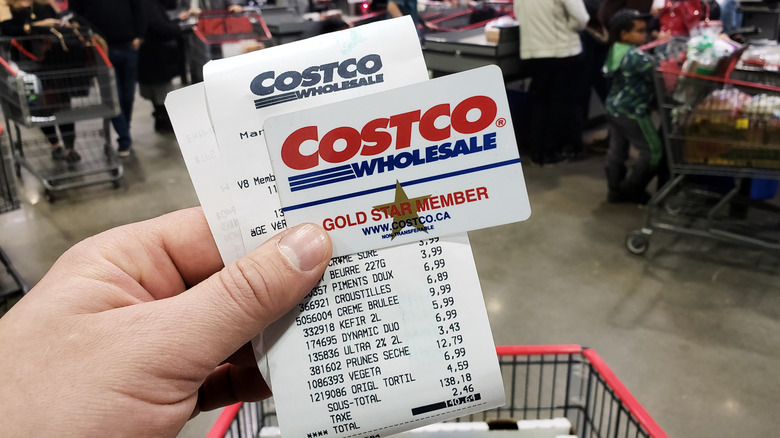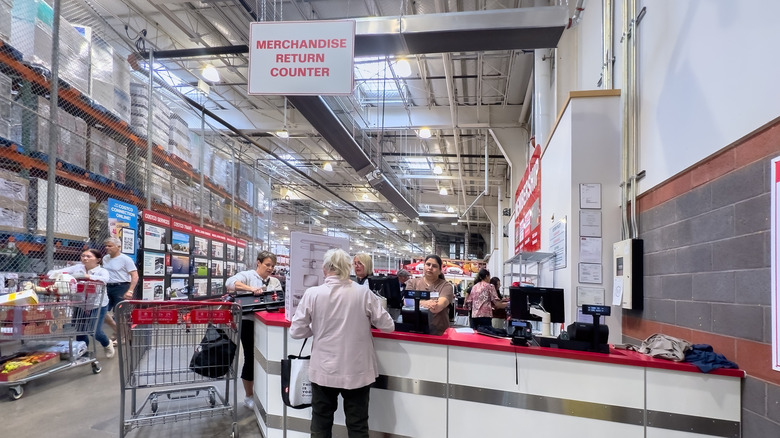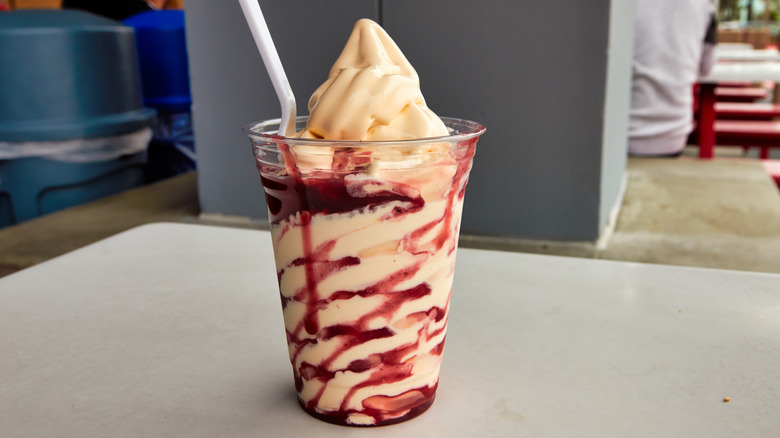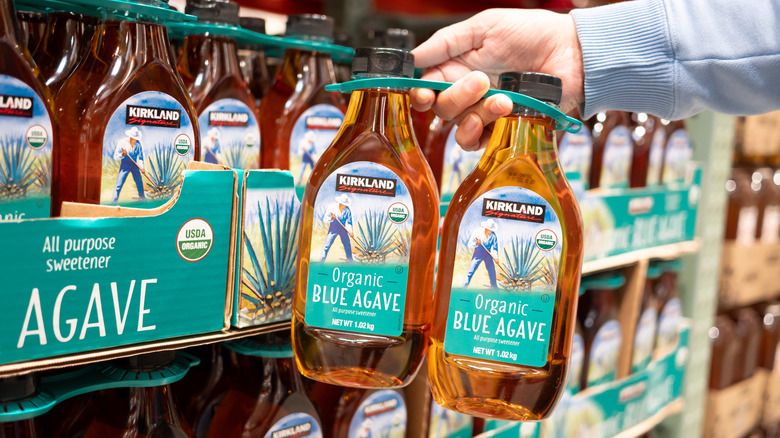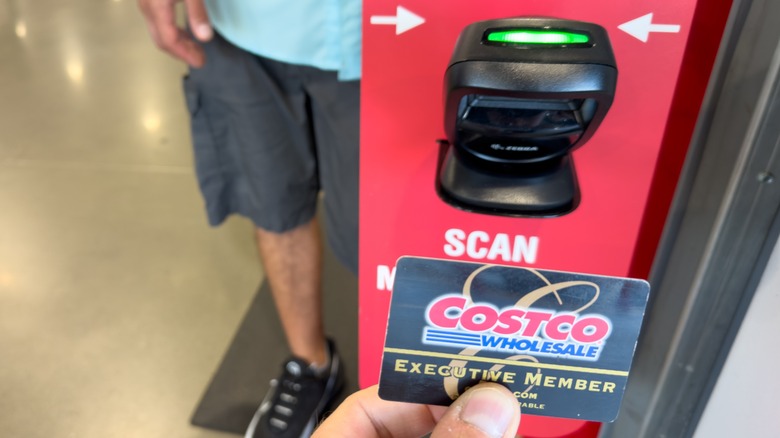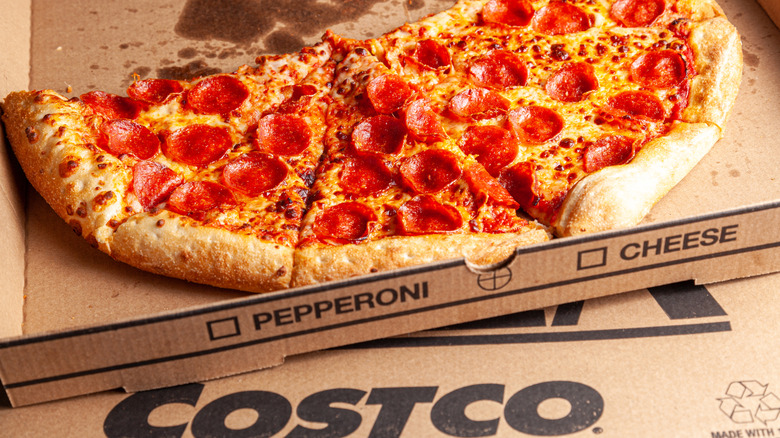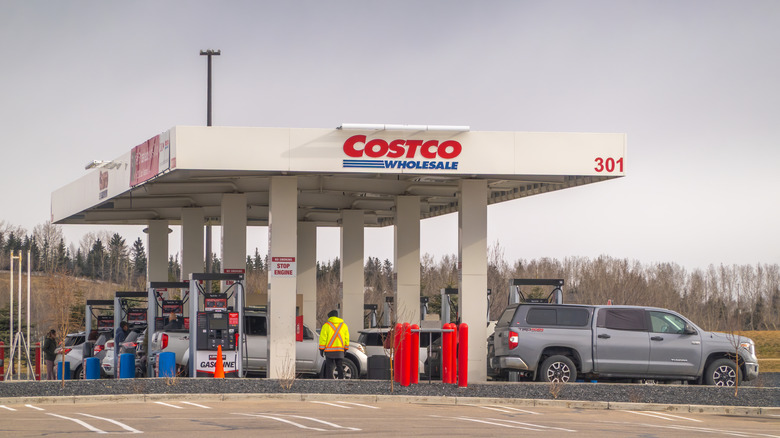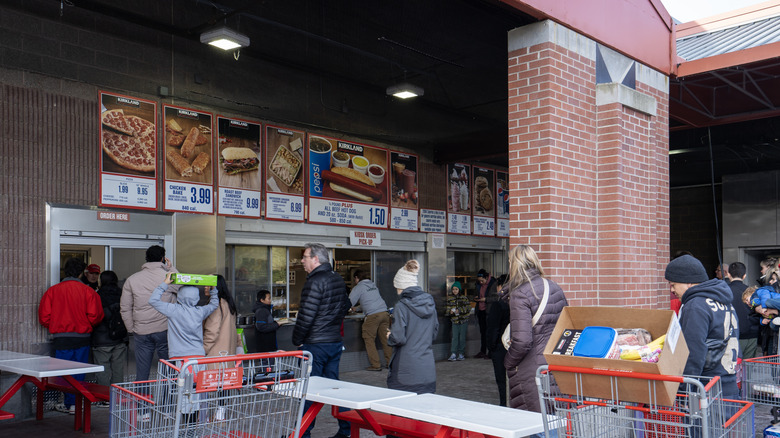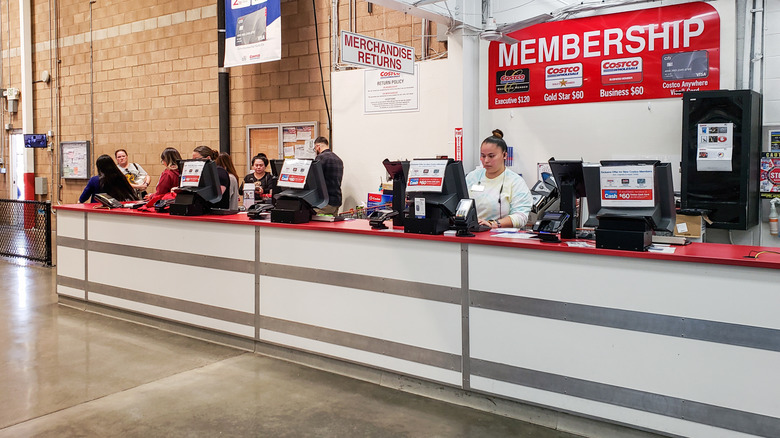11 Things Costco Always Does Better Than Sam's Club
Costco and Sam's Club look similar on the surface. Both are warehouse-style retailers that trade ambiance for bulk savings — but ask almost any devoted member, and they'll tell you the differences are obvious. There are pros and cons to each, but there are some things that Costco always does better than Sam's Club. Whether you're in it for the groceries, the perks, or the pizza, there are plenty of areas where Costco consistently comes out on top.
It's not just brand loyalty that makes some people prefer Costco, it's the little things that add up. Shoppers love that they get generous return policies, better food court experiences, and its house-labeled products that are just as good as big name brands. And while Sam's Club has its strengths, Costco's reputation for quality, transparency, and consistency has helped it maintain an enthusiastic following among shoppers across the country.
Here, we're breaking down 11 things Costco simply does better than Sam's Club. So, whether you're debating which membership to get or just curious why your Costco-loving friend won't stop talking about Kirkland Signature wine, this list has you covered.
1. Costco has better quality house-labeled products
Kirkland Signature isn't just good for a store brand, it's often better than the national competitors sitting right next to it on the shelf. Over the years, Costco has turned its private-label line into a major draw, with shoppers singing the praises of everything from the golf balls to the olive oil, almond butter, batteries, and whiskey. And it's not just fan hype. You might not know that many Kirkland Signature products are made by well-known name brands, just without the flashy packaging.
Compare that to Sam's Club's Member's Mark line, which has improved in recent years but still doesn't have the same reputation for consistency or standout quality. Kirkland regularly wins on flavor, performance, and ingredients, especially in food and household staples. Costco takes a "premium-first" approach to its own brand products, and it shows. The chain has been open about working with top suppliers and testing rigorously to meet its standards.
We ranked grocery store brands and Kirkland came out on top, proving its products aren't filler. Shoppers trust that if something has the Kirkland label, it's going to be good, and often better than the name brand at a lower price. That brand trust is hard to earn and even harder to replicate. So, if you've ever wondered why someone would go out of their way just to stock up on Kirkland Signature maple syrup, now you know.
2. Costco has better samples than Sam's Club
Free samples might sound like a small perk but, honestly, they're one of the best things about shopping at a warehouse store. If you've ever wandered through a Costco on a Saturday afternoon, you already know the drill. It makes those bright lights and endless aisles seem worth it. And Costco does samples better than Sam's Club. It's that simple.
Costco's sampling game is so strong that some shoppers plan their trips around it. It's like a mini food festival and you can get all your groceries at the same time. The samples aren't just random or low-effort. Costco partners with vendors to highlight high-quality items, many of which are new, seasonal, or exclusive to the store. Because of the large store size of Costco, it can fit plenty of samples under its roof. And you can get them throughout much of the daytime hours — usually around 11 a.m. to 5 p.m.
In contrast, Sam's Club has samples too, but they're often more limited and less consistent. Some days you'll find one or two scattered tables, and other times, none at all. You can occasionally get free samples of alcohol at Sam's Club, but that doesn't make up for the inconsistency and lack of availability of other samples. For families with kids, hungry shoppers, or anyone who appreciates a little treat, Costco's sample program is part of what makes the trip enjoyable. Sam's Club can't live up to it.
3. Costco advertises its markup cap — and it's just 15%
One of Costco's most appealing traits is how transparent it is about pricing. When it comes to pricing, the chain has a simple promise: it caps its markup at 15%. That's incredibly low compared to traditional grocery stores, which often have a 25% to 50% markup or more. Costco is open about this low markup policy and sticks to it religiously.
What does that mean in practice? You're not paying extra for flashy displays, ambient music, or mood lighting. Costco is a bare-bones experience for a reason: the savings are real, and they're passed directly to members. The company makes most of its profit from membership fees, not product margins, which means it has a real incentive to keep prices low and customers happy.
By contrast, Sam's Club hasn't made a similar public commitment to low markups. While it does offer competitive pricing, it's harder to know how much of that is baked into the product costs versus covered by promotional pricing or member perks. Costco's pricing model feels more trustworthy. This transparent markup policy offers peace of mind. You don't have to be a spreadsheet-toting coupon clipper to appreciate that kind of consistency.
4. Costco has a more generous return policy than Sam's Club
When it comes to returns, Costco's policy is so famously generous that it's practically a meme at this point. Bought a couch and realized it doesn't fit your living room six months later? Take it back. Got a giant container of trail mix and hated the flavor? Return it, opened. The store's risk-free satisfaction guarantee covers almost everything, and for many items, there's no time limit. Some of the most puzzling things people have genuinely returned to Costco include an 11-year-old pillow and a cat litter box with the litter still inside.
Costco's return approach is simple: if you're not happy, they'll make it right. Electronics and appliances have a 90-day return window, which is more than reasonable, but nearly everything else is fair game for returns with minimal fuss. You can even return food to Costco. In fact, the company has been known to take back half-eaten items.
Sam's Club also offers returns, but the policies are stricter, which isn't hard. Some items are ineligible, others have narrower return windows, and customers report more pushback or complications, especially for electronics and opened items. The experience varies more depending on the store or staff. It's not that it has a bad return policy, it's just not as comically lax as Costco's. So, if you have a feeling you might want to return your dead Christmas tree come January, you'll be wanting a Costco membership card.
5. Costco has tastier soft serve
It's hard to talk about warehouse grocery stores without mentioning the food court. Hot dogs often get all the press, but you'd better not forget about soft serve, and Costco is the clear winner. The store's frozen treat has a cult following for a reason. When you compare Sam's Club and Costco's soft serve, both have pros and cons, but Costco is where it's at.
What we love is that it isn't fancy but gets the basics exactly right. The chocolate is satisfyingly cocoa-forward, the vanilla is actually flavorful, and it doesn't melt into soup before you get halfway through the cup. You can also order a twist, which is a combo of chocolate and vanilla.
Sam's Club also offers soft serve, but technically it's frozen yogurt, which we all know that's objectively worse. It's slightly cheaper, but only by around a dollar, and we'd much rather get a tastier ice cream. If you're the kind of shopper who rewards yourself with a sweet treat after hauling home a trunk full of bulk groceries, Costco's soft serve is the better bet every time.
6. Costco has a better range of organic items
If you care about organic groceries, but also want to avoid spending $9 on a bunch of kale, Costco is the store for you. The warehouse giant offers a surprisingly broad selection of organic goods, from veggies to pantry staples like canned beans, pasta, and olive oil. Better still, the prices are often far lower than what you'd find at a traditional grocery store or a specialty organic market.
Kirkland Signature has leaned into organic in recent years, offering house-brand options that are high in quality and low in price. You can even find organic versions of snack foods like tortilla chips and granola bars. Sam's Club does offer organic products, but not at the same level of consistency or depth. Availability can vary widely by location, and the selection tends to skew toward basics. For vegan, plant-based, or health-conscious shoppers, that makes Costco the more reliable option.
Costco also puts effort into labeling and sourcing, with clear signage in-store and online that helps you spot organic items quickly. And thanks to its size, the chain has enough buying power to make organic foods more accessible, especially for families on a budget. In short, if you want to eat organic without treating it like a luxury lifestyle choice, head on over to Costco.
7. Costco has better cash-back rewards than Sam's Club
One of the benefits of higher tier warehouse club membership is the cash-back rewards. When you're a regular shopper at these stores, especially if you have a large family or run a small food business, you can end up making enough to cover your membership fee and way more. Although Costco's membership is more expensive than Sam's Club's, you can earn more back.
Costco's Executive Membership is $130 a year. For this, members get 2% cash back on most Costco purchases with a cap of $1,250 annually. That includes groceries, travel bookings through Costco Travel, and even some services. Depending on how often you shop, that rebate can pay for the upgraded membership entirely. The process is also simple: Costco automatically tracks your purchases and mails you a reward certificate each year, which you can use like cash in-store.
Sam's Club offers a similar cash-back system through its Plus membership, which costs $110 a year. It also gives 2% back, but there's a cap of $500 per year, so you can earn less cash back overall. This isn't a big deal unless you're a big spender. But if you spend a large amount on groceries, shopping with Costco could mean you're almost $750 better off each year.
8. Costco's pizza is better than Sam's Club's
Warehouse pizza is a big deal. Technically speaking, Costco is one of the biggest pizza chains in the country, with people drawn in by its low prices and easy availability after a tiring grocery run. Sam's Club also sells pizza but Costco's pizza wins the face-off. It's not just good-for-a-grocery-store pizza, it's legitimately good pizza (in a junk food kind of way). At $1.99 a slice or $9.95 for a full 18-inch pie, you're getting a massive, cheesy, satisfying meal for less than some frozen options.
The crust is floppy in that satisfying way, the cheese coverage is generous and gooey, and the sauce is surprisingly flavorful. You've got your choice of pepperoni, cheese, or combo, and it's made fresh in-house. What's more, it's the cheaper of the two options.
Sam's Club also sells pizza by the slice and pie, charging $2.49 a slice or $8.99 for a 16-inch pie (which is costlier inch-for-inch). It's not hugely more expensive than Costco's offerings, but the flavor just doesn't measure up. The crust tends to be bland, the sauce is sweeter, and the toppings can be sparse depending on the location. It's perfectly serviceable, but it lacks the craveable quality that makes people go out of their way for a Costco slice. It's pretty much worth the membership fee just to have access to Costco pizza.
9. Costco offers Top Tier gasoline, but Sam's Club doesn't
Both Costco and Sam's Club offer discounted fuel to their members, but when it comes to quality, Costco has the edge. That's because Costco sells Top Tier gasoline — a classification that means the gas meets a higher standard of detergent additives recommended by major automakers. These additives help clean your engine and improve long-term performance, potentially saving you money on repairs down the line.
Not all gas is created equal, and while Sam's Club gas is often cheaper than traditional stations, it doesn't always meet the Top Tier standard. That means you're getting a deal on fuel, but not necessarily the same level of engine protection. For anyone who wants to stretch their vehicle's lifespan, Costco's Top Tier gas is a clear win.
Both clubs limit gas access to members only, so if you're already paying for a membership, it's a perk you should absolutely use. But if you're deciding between the two, and gas is a major factor, Costco's higher-quality fuel gives you more than just savings at the pump, it might save you money in the long run.
10. The experience at Costco food courts tends to be better than at Sam's Club
Warehouse store food courts are basically legendary at this point. Even people who have never set foot in one of the chain's stores know about Costco's $1.50 hot dog and soda combo. And Sam's Club's is even cheaper — but just by 12 cents, so don't let that sway your decision too much. Both stores have wallet-friendly food courts, but the experience at Costco consistently stands out.
The menu at Costco is streamlined but well-loved — and the quality is good. Of course, you're not going to get a gourmet meal, but it's excellent for a discount store food court. At Sam's Club, the offerings don't always meet expectations. Unreliable service, and lukewarm food are common complaints from Sam's Club regulars — and the self-checkout-style kiosks are convenient in theory, but don't always make for a smooth experience.
At Costco, you know what you're getting, the portions are generous, and there's a surprising level of care put into even the most affordable items. The rotisserie chicken Caesar salad is fresh and filling, the soft serve is delicious, and that $1.50 hot dog is still unbeatable after all these years. The queues tend to be shorter, too, because only members can use the food court, while anyone can eat at Sam's Club, regardless of membership status.
11. Costco pays its employees more than Sam's Club
One of the more quietly important differences between Costco and Sam's Club is how each company treats its employees, particularly when it comes to pay. And while both stores operate in the same ultra-competitive retail space, Costco has consistently come out ahead in this category.
Costco has long been known for offering better-than-average wages, and as of recent reports, starting pay for hourly employees is $19.50 per hour, with opportunities to earn significantly more over time. Sam's Club, which is owned by Walmart, tends to lag behind. While it has made improvements in the last few years, its base starts at $16 per hour, and employees don't report as much room for progression. At Costco, team members might be earning close to $30 per hour after being with the store for five years. Plus, everyone gets time-and-a-half on Sundays.
Higher pay isn't just a feel-good detail — it often translates to a better shopping experience. Happier, better-compensated employees tend to be more engaged, more knowledgeable, and more willing to help. Costco also offers competitive benefits, which helps with employee retention and contributes to the company's famously low turnover rate. These better conditions create an environment where people want to work, and by extension, a place where customers want to shop. The employees' paychecks may be behind the scenes, but they're a part of why many people feel better supporting Costco with their dollars.
